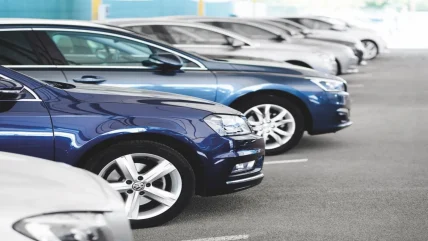
We first ask Emmett if he believes that fleets will be able to transition to EV in time for 2030 – and how LeasePlan can help their customers with the move?
He says: “The starting point is research, and our insights revealed 29% of fleet managers feel they lack sufficient knowledge to help advise their drivers on EVs. Yet nine out of 10 people questioned in our LeasePlan Survey, said they’re still expected to be the EV expert within their business. LeasePlan is working to bridge that gap. That’s the challenge we’ve got, so we’ve developed a load of tools, guidance, and expertise, to help people through. The premise here is education to empower people.
“For, instance, our EV Readiness tool, helps customers evaluate their current position, their maturity in the adoption process, and how far they are on the journey. Then when the fleet managers have worked out their maturity, we then have a ‘Driver Assessment tool’ – that’s on an individual basis. Asking if an electric vehicle is right for you? Can you charge at home? What sort of distances are you travelling? Then, we provide guidance on charging, whether that’s workplace charging, or how to set up your drivers for home charging – across the board.
“Depending on the size of the organisation, we would then support with EV fleet consultancy. The consultancy would start with suitability of vehicles, the funding of products – it’s about what is the most relevant for that organisation to help them on that journey.
“The real focus is education, and we’ve seen a big challenge here. If you think a few years ago, there was a lot of conversation about range anxiety, and then you hear about charging anxiety. The reality is, it’s change. It’s helping people understand, and that’s where we feel the tools, the education we’ve done with our ‘Electric Moments’ awareness campaign and things like that help people through. The more you can help someone through the journey, and feel like it’s their decision, the better it is.”
Emmett tells us that interest in EVs continues to accelerate for business and personal leases.
He says: “As you appreciate SMMT data shows new registrations for battery-electric vehicles (BEVs), are up 59% year on year, and this is reflected across our order book. There’s no room for complacency though, as we’ve moved through the early adopters, and we’re now coming into the second cohort. They’re the ones that need more sustained support through this engagement. Again, this comes back to the education, as mentioned.
“The early adopters were the ones that really enthused about it, and they were willing to work through any problems. The second cohort need more help. They need more guidance through the process, and again it comes back to my previous point, on the human behind the wheel being where the change is. Previously, we put petrol or diesel in a vehicle, now it’s the whole charging process.”
LeasePlan was an early adopter of salary sacrifice, with its first scheme in 2010. As such, Emmett believes these are the saviour to turning company fleets electric.
He says: “We were an early adopter, particularly supporting public sector employers – those organisations that were keen to provide a company car to the wider population. They were quick to realise the benefits, and the Green Car Schemes as they were, plus the tax savings, have been very attractive. Then, when the government carved out low-emission vehicles from OpRA legislation, it’s safe to say across the industry there was a real sigh of relief.
“Looking forward, we’ve got certainty on BIK rates until the end of the 27/28 tax year, so fleets have got that confidence to encourage EV uptake within their organisation. I hope it is a long-term solution, and we see salary sacrifice as a positive process to engage adoption. We’ve seen their long-term effectiveness, but that’s wholly dependent on government policy. As an industry, we need to keep pushing that, to help everybody transition to electric.”
Emmett says EV supply continues to be a challenge and it depends on manufacturer, and what type of vehicles people are after.
He says: “We work really hard with clients to ensure they have the vehicle that they need at the right time and fitting their budget. Then, we do a lot of education with fleet managers, to navigate any delays, coordinate a charging infrastructure, and then offering flexible solutions. So that could be offering a vehicle we have available in
our LeasePlan Flexible stock – offering a lead-in vehicle.
“For us it is all about keeping our customers mobile, and making solutions work for them. Look further forward a bit, the 2030 deadline is only two lease replacement cycles away. So, we’re actively encouraging organisations hard to get them to make sure that they’re on that trajectory, that they are planning, and they are doing this in advance. We do a lot of communications, if we look back, when we did have supply challenges, to then help people understand what was going on. Then helps with the replacement cycle, so that if drivers are due to come out of a vehicle, just planning that little bit further ahead can help to avoid some of those long delays.
“I think whether this is a smooth transition, will depend again on education and understanding. We see some fleets that are keen to be the leaders in the market. We see others, who need help engaging. It’s down to us to say, here’s a case example that you could follow, and these are the steps that they took. Then, work through them pragmatically. There’s a whole industry that’s willing to work together, to help organisations that are less mature than others – because at the end of the day it’s the end user – the driver that really needs the help and support.
“The fleet manager and senior manager have all committed, but what if the driver is struggling with it – how do we help them? What additional things do we deploy?
How do we do that? Do we do a roadshow, do we do a ride and drive? There are all sorts of things that we can do to help them through that process, but it must be nuanced and, on a case-by-case basis, but I think that’s where we can add a lot of value.”





